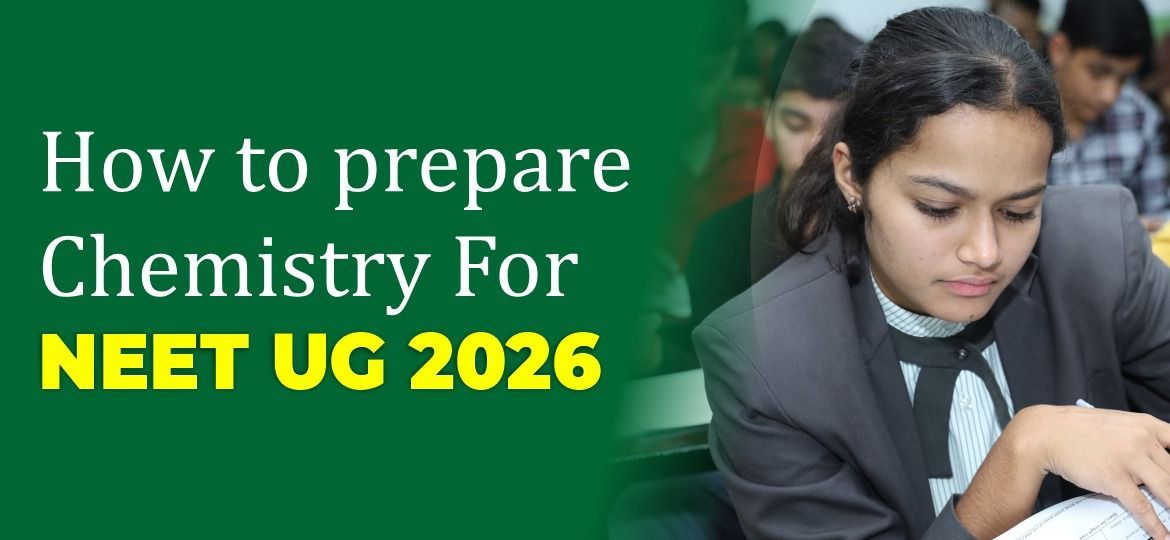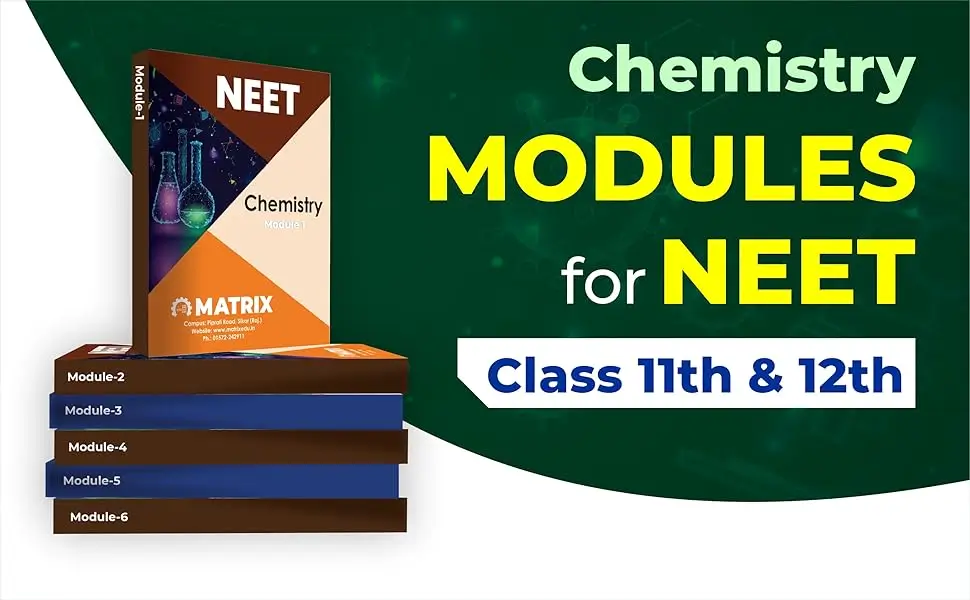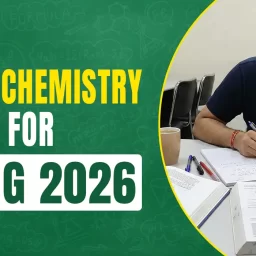
How to Prepare Chemistry for NEET UG 2026?
Chemistry is considered one of the highest-scoring subjects in the NEET exam, where implementing a strategic approach can effectively support understanding the subject from its basics. Chemistry contains direct, conceptual, and formula-based questions that can be solved quickly with effective time management, conceptual clarity, and application-based skills.
At Matrix Academy, we believe in transforming your potential into real performance. Our well-organised and structured preparation strategy ensures time management, conceptual clarity, and application-based skills in all three areas: Organic, Inorganic, and Physical Chemistry. Reading this blog will boost your confidence in preparing for the Chemistry (Organic, Inorganic, and Physical Chemistry) exam for the desired NEET results.
Overview of NEET UG 2026 Chemistry
The NEET Chemistry section assesses the overall understanding of a NEET aspirant in three broad areas, namely Organic, Inorganic, and Physical Chemistry. Organic Chemistry includes carbon compounds and their chemical reactions, while Inorganic Chemistry is based on elements and their compounds by excluding carbon-based compounds. Physical Chemistry combines the concepts of matter, energy, and various chemical reactions.

The chemistry subject covers 180 out of 720 marks in the NEET exam paper. A detailed overview of the NEET Chemistry subject is as follows-
| Particulars | Details |
| No. of Questions | 180 |
| Total Marks | 720 |
| Marks for Correct Answers | +4 |
| Marks for Negative Answers/Unanswered Answers | -1/0 |
| Exam Duration | 180 Hours |
| Exam Mode | Offline |
How to Prepare Inorganic Chemistry for NEET UG 2026?
Inorganic Chemistry is generally about memorising facts. At Matrix, we offer students a structured approach to simplify Inorganic chemistry by dividing learning into three phases: rigorous practice, concept building, and final exam preparation. This area of Chemistry subject mainly demands an effective understanding of the bonding, periodic table, metallurgy, coordination compounds, and s-, p-, d-block elements. We suggest following these tips to strengthen your Inorganic Chemistry preparation:
Key Strategies to consider:
- Matrix Academy considers Inorganic Chemistry as a subject with pattern recognition and smart memory, supported by strong conceptual foundations. Our Chemistry educator, Birbal Maan Sir, suggests dividing Inorganic into three major sections: core facts (coordination compounds), fundamental concepts (periodic trends), and high-yield reactions (common lab reagents). This categorisation method helps in creating a structured and systematic study approach by ensuring a comprehensive understanding, better retention, and exam success.
- Conceptual Clarity: Inorganic Chemistry is a subject based on core concepts. Matrix Academy teaches students with conceptual clarity, where the primary focus is on answering two major concepts: “why” and “how”. This approach helps in understanding pattern recognition in periodic trends and chemical bonding. Matrix offers a structured learning path by focusing on making these areas easier to understand with visual aids and interactive discussions.
- Periodic Table Mastery: Periodic tables are the core centre of Inorganic Chemistry. For this, Matrix Academy focuses on ensuring that every student clearly understands the properties and trends of the periodic table. Students regularly solve expert-developed chapter-wise exercise sheets, Daily Practice Problems (DPPs), and doubt counters to ensure that they have good practice and support.
- Practice Questions: We recommend daily practice of the previous year’s NEET questions, followed by regular mock tests to enhance memory recall and improve accuracy in time-bound situations. For example, Matrix Academy offers daily/weekly practice with previous year practice questions. Matrix-designed question banks have more than 10,000 MCQs and 3,000 previous year questions, including different topics of Inorganic Chemistry, to improve memory optimisation and accuracy in time-bound situations.
- Practice Banks and Revision Marathons: Practice banks are very useful in Inorganic Chemistry because they offer active recall support. You can take assistance from Matrix Practice banks, as one of the most unique book sources, based on the “why-this-option” concept. NEET students can attend error elimination sessions, where weekly common mistakes (mis-assigning oxidation states, forgetting electronic configuration) are addressed. Matrix conducts last-day revision sessions for students, where students revise all the Tree charts, memory anchors, and solve a 200-question mock test covering all inorganic areas.

Matrix Tip: Matrix experts always suggest practicing with in-depth modules designed by their expert educators. More than 150+ experts designed 11th and 12th class NCERT-based modules, which are a combination of 600+ PYQs & 2650+ MCQs. These books cover all three areas of Chemistry: Organic, Inorganic, and Physical Chemistry.
You can also order these books by clicking here: Matrix NEET Chemistry Books
Common Mistakes to Avoid:
First, you should focus on developing a deep understanding of the concepts, instead of simply learning them. Most of the students generally avoid reaction mechanisms and exceptions, which helps in creating a base for solving advanced-level questions.
How to Prepare Organic Chemistry for NEET UG 2026?
Organic Chemistry in the NEET exam is a subject based on the concept of mechanism-first learning, where the Matrix NEET division organizes lab-based sessions for this approach. Our expert educators teach the mechanism step-by-step by promoting questions like: “Why does the nucleophile attack here?”
- Strengthening Fundamentals: Your foundation should be developed with a clear understanding of the basic concepts, like organic reactions, IUPAC nomenclature, and functional groups, which help in building a base for difficult topics.
- Focus on Reaction Mechanisms: Reaction Mechanism is a key factor in mastering NEET-level Organic Chemistry. Matrix Chemistry educator Birbal Maan Sir teaches with visual support like reaction maps, flowcharts, and a step-by-step guide for easy explanation of mechanisms. This kind of specific approach helps in creating a learning culture, where students not only read reactions but also understand their logical flow. Birbal Sir always teaches Organic Chemistry to his students by using in-class teaching, interactive video lectures with 3D animations for complex concepts, and problem-solving techniques.
- Application-Based Practice: Matrix Academy’s Organic Chemistry faculty teaches students with scenario-based problems. You have to learn in a system by finding the easiest and shortest path to create a target molecule, while also understanding how the reaction occurs. This approach helps in answering higher-order reasoning questions.
- Mnemonic Method: You can use interactive 3D models in class by setting a 20-minute challenge every week to label conformers correctly. You can use this method effectively for topics like stereochemistry, conformers, and rearrangements.
Common Mistakes to Avoid:
You should memorise all important mechanisms and named reactions. However, Organic Chemistry problem-solving questions must be solved with an understanding of the why concept. At Matrix Academy, our focus is on developing conceptual clarity instead of rote learning.
Matrix Tip: The systematic study design for Organic Chemistry combines practice sessions and regular tests, which support students in easily learning the challenging topics. Our Chemistry faculty also organises problem-solving sessions that focus on high-weightage topics for NEET UG 2026.
How to Prepare Physical Chemistry for NEET UG 2026?
One of the most effective ways to prepare for Physical Chemistry is to begin with the concept ladder method by strengthening easy and foundational topics like atomic structure, stoichiometry, mole concept, and many more. At Matrix, we make this approach a culture in Tier 1 lectures by providing high-definition videos and live workshops through MATLAB, where each concept is broken into micro-steps. This approach is developed graphically and based on the real NEET UG 2026 exam pattern.
- Unique Problem Templates: You can practice with the Matrix-designed template sheet for the different types of calculations, such as thermodynamics, kinetics, and equilibrium. Students regularly practise templates every week in supervised batches, where they also get on-the-spot solutions if they are facing any issues.
- Timed practice sessions: One of the best approaches for mastering Physical Chemistry is regular practice of timed-based practice sessions. For example, you can allocate 30 minutes to solve 15 Physical Chemistry problems. You can take assistance from Matrix Academy’s unique timed practice sessions, which are based on a personalised, concept-focused approach combined with strategic practice.
- Problem-solving Techniques: The whole concept of Physical Chemistry is based on applying concepts for solving problems. Our expert educators teach personalised methods to the students for handling these questions step-by-step. We also conduct effective problem-solving sessions, where our students are guided to tackle questions from each topic efficiently.
- Using the Formula-flash system: Our expert educators recommend that every student study Physical Chemistry with the formula-flash deck method and colour-coding trick. For example, red for kinetics, blue for equilibrium, green for thermodynamics, and so on.
- Practising Mock Integration Test: Matrix Physical Chemistry educator Deepak Sir (10 years of experience in teaching) suggests that students should daily practice 40-50 questions to improve their foundation. You should practice group debriefs, where Deepak Sir focuses on explaining strategic shortcuts to the students.
Also Read: Our detailed blog on Physical Chemistry Chapters for NEET UG 2026, which offers you a detailed analysis regarding the chapter-wise breakdown of the NEET Physical Chemistry syllabus.
Common Mistakes to Avoid:
Students should focus on managing various units properly. At Matrix, we ensure that our students become experts in unit conversion techniques and how they impact calculations. Apart from this, never avoid the mole concept. The Mole concept is considered the foundation of Physical Chemistry, where we focus on reinforcing this concept early in the preparation process.
Matrix Tip: Matrix test series are uniquely designed with the base that students are well-prepared for the real exam conditions. We also focus on providing efficient problem-solving strategies to improve time management during the final exam. You can also refer to the NEET 2026 high-weightage Chemistry chapters for the detailed analysis.
Matrix Academy Suggested Tips to Score Full Marks in NEET UG 2026 Chemistry
Achieving a full score in NEET Chemistry is possible by implementing effective time management, consistent practice, and mastering key concepts. Matrix Academy’s unique tips for achieving full marks in NEET UG 2026 Chemistry are as follows-
- You should aim to attempt at least 200 questions in mock sets per subject area, with a full section simulation every week. You should also monitor internal analytics based on the monitoring accuracy, with the exact time allocated for each question.
- At Matrix Academy, we ensure that all three domains (physical, inorganic, organic) are covered by using our personalised checklist and colour-coded tracker. You have to provide effective time for all three areas of Chemistry. For example, you can allocate 30% of time to organic, 30% to Inorganic, and 40% time to Physical chemistry. You can also visit the blog: How to prepare for NEET 2026 in Sikar for a deep understanding of the NEET preparation.
- You should practice attempting mock tests to develop your core in this subject. You should practice solving Chemistry mock tests in less than 45 minutes during the mock tests.
- This looks like a simple tip, but Matrix clearly understands the value of mastering NCERT books, because it helps in creating a strong foundation for most of the Chemistry NEET questions. 80-85% of the NEET Chemistry questions are directly or indirectly from the NCERT syllabus. This pattern is useful in subjects like Organic and Inorganic Chemistry because both subject areas are based on fact-based questions. We promote students to practice various exercises mentioned in the NCERT books with the approach to make notes of the important formulas, concepts, and reactions.
- You should make a specific target-based revision strategy to improve your score in NEET Chemistry. For example, instead of solving a single chapter’s questions, you can focus on solving 50 questions per day from a wide range of topics.
Also Read:
If you want a complete and structured preparation for the NEET UG 2026 exam, then you can study our recent blog posts mentioned below-
Conclusion
Always consider NEET UG 2026 Chemistry as a strategic scoring opportunity, not as a difficult subject. You can become a master in NEET Chemistry with the implementation of regular practice, concept-based clarity, and strategic time management. Matrix Academy expert educators suggest you should focus on understanding mechanisms, memorising key reactions, and practising application-based problems to improve accuracy and speed. At Matrix Academy, our primary focus is on ensuring that our NEET students create a deep understanding of the subject core topics, which supports them in scoring maximum marks in the final exam.
FAQs
NEET Chemistry preparation demands regular practice of mock tests, NCERT-based problems, and focus on conceptual learning. All these factors are effectively maintained during the preparation journey of a NEET UG 2026 aspirant at Matrix Academy with a focus on quality learning and overall student development.
Your primary focus is on covering NCERT-based Chemistry textbooks for the development of a strong foundation. Once you have a strong command of NCERT concepts, you can also improve your preparation with Matrix-designed question banks, a combination of 10,000 MCQs and 3,000 previous year questions. These question banks help in increasing conceptual clarity and speed.
To score 180/180 marks in NEET Chemistry, you should focus on mastering the NCERT by practising Matrix’s offered extensive modules. You can also take assistance from the test series and Daily Practice Problems (DPPs) offered by Matrix Academy, based on simulating real NEET UG 2026 exam conditions.
Organic Chemistry can be effectively mastered by learning reaction mechanisms, focusing on functional groups, and regularly practising named reactions. Expert faculty at Matrix Academy teach Organic Chemistry to the students with flowcharts, visual aids, and mechanism-based problem-solving sessions for quality understanding.
You can use flashcards, periodic trends, and pattern-based learning for memorising Inorganic Chemistry. The structured approach at Matrix Academy focuses on memory anchors, tree charts, and revision sessions for the simplification of the memorisation process in Inorganic Chemistry.
Physical Chemistry demands conceptual understanding, daily formula revision, and solving numerical problems regularly. For this, Matrix Academy offers specialised practice sessions, problem templates, and formula-based questions for effective learning.
NCERT is one of the crucial sources because 80-85% of the NEET UG 2026 Chemistry questions are directly or indirectly from the NCERT syllabus. At Matrix, we focus on ensuring that our students become masters in NCERT concepts by regularly practising focused exercises, short notes, and targeted revision sessions.





